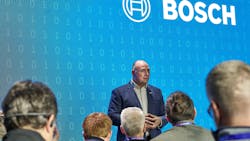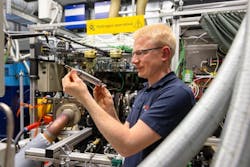Bosch: ‘We’re still heavily involved in hydrogen’ as trucking’s future fuel
LAS VEGAS—While hope has waned in hydrogen as the future fuel of long-haul transportation, Bosch still sees a future for the potentially emissions-free solution that continues to show more promise than growth.
A year ago, the global Tier One supplier used the CES 2024 stage to announce it would develop a hydrogen-powered internal combustion engine for heavy-duty trucking to complement the hydrogen fuel-cell stack it began producing in 2023.
“Hydrogen, in general, has slowed a little bit if you look at the market in total. We’re still heavily involved in hydrogen,” Paul Thomas, who last summer took over as president of Bosch North America, said during a Q&A session with the Fosgard House of Journalists at Mandalay Bay here on the Vegas Strip on January 6, the day before CES 2025 officially opens across the city.
Bosch is developing H2 engine injection system components, including a new direct injector that requires no additional lubrication and is scheduled for launch in 2026. The first hydrogen engines with Bosch intake manifold injection are expected to launch later this year.
While Bosch and other Tier One suppliers, such as Cummins, develop hydrogen trucking power solutions, the fuel continues to face a chicken-or-the-egg conundrum: With little public hydrogen fueling infrastructure beyond California ports, fleets aren’t investing in H2-powered trucks; with few trucks to fuel (and complicated fueling and procurement operations), public H2 fueling growth is slow.
See also: Can hydrogen actually work for trucking operations?
More CES 2025 coverage from EBM
Endeavor Business Media has several editors at the largest technology conference and exhibition in North America this week. Here are other stories FleetOwner affiliates are covering in Las Vegas.
President Joe Biden’s Department of Energy set a path for the nation to develop regional hydrogen infrastructure over the coming years by promising $8 billion in federal investments into regional green hydrogen hubs. With uncertainty over how Trump will treat hydrogen, Biden loosened some hydrogen tax credit safeguards last week to boost the nascent industry before Trump takes office later this month.
“With the government, we’ve been involved in developing electrolyzer technology to produce hydrogen energy in the region,” Thomas said. “And in some of our other areas, like our industrial technology and our Rexroth division, we’ve developed a way to deliver hydrogen in much more effective ways.”
Bosch Rexroth has been developing a better way to fuel with H2. “One of the most inefficient things in the market today is how you fuel a hydrogen truck,” Thomas explained. “You lose between 60 and 70% of the energy during the fueling process.”
He said the pump, developed by Bosch Rexroth and FirstElement Fuel, is more efficient and quicker than previous H2 fueling infrastructure.
How FirstElement and Bosch are making H2 fueling more efficient
FleetOwner saw the FirstElement cryopump hydrogen fueling operation in action during a visit to Oakland in 2024.
Hydrogen refueling is more complex than gasoline and diesel refueling. This is because “hydrogen is stored on-site either in liquid form at minus 253 degrees Celsius [minus 423 degrees Fahrenheit] or as a gas in tanks with various pressure levels,” according to Bosch Rexroth.
This means that “hydrogen must be compressed in a controlled manner to between 700 and 900 bar,” about 10,000 to 13,000 psi, to refuel vehicles.
As hydrogen moves, it heats up. When filling the large tank of a Class 8 vehicle, it rapidly expands. To achieve a fast fill, hydrogen must be pre-cooled to prevent it from heating up to the point that it loses its energy, Stephens explained.
The cryopump now solves this problem because it compresses hydrogen by 700 bar, leading to much quicker refuel times. It also maintains the sub-cooled temperature. In one step, a cryopump converts cold, liquid hydrogen into cold, compressed hydrogen and delivers it into the vehicle.
“So we’re going to keep our eye on the infrastructure,” Thomas told FleetOwner on Monday. “Of course, we all know that the new government might either go heavy into hydrogen as much as before—or not—but we’re closely tied to the DOE. We’re happy with what we’re seeing related to the production of hydrogen in the region and usage in fuel cells. Of course, we’re still a partner with a large commercial vehicle manufacturer that makes trucks.”
Bosch also continues to supply Nikola with the hydrogen fuel cell stack for Nikola’s Class 8 FCEV. Nikola sold 88 of the trucks in the third quarter of last year.
Thomas said that while Bosch will continue to develop its H2 ICE technology along with its fuel cells, like much of the trucking industry, it is waiting to see what aspects the next White House focuses on.
Right now, hydrogen isn’t always considered a zero-emission fuel because of how it’s made. “As far as combustible hydrogen, there are lots of discussions now with the government [to determine] whether that qualifies as a zero-emission vehicle or not,” Thomas said. “We’re just going to see how the regulatory environment works out.”
About the Author
Josh Fisher
Editor-in-Chief
Editor-in-Chief Josh Fisher has been with FleetOwner since 2017. He covers everything from modern fleet management to operational efficiency, artificial intelligence, autonomous trucking, alternative fuels and powertrains, regulations, and emerging transportation technology. Based in Maryland, he writes the Lane Shift Ahead column about the changing North American transportation landscape.


